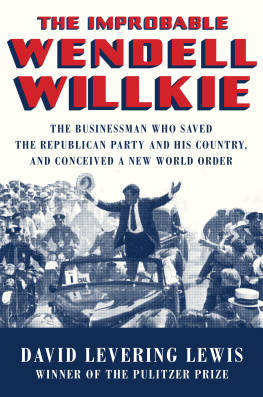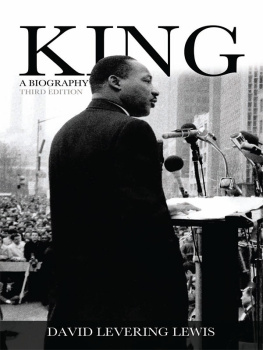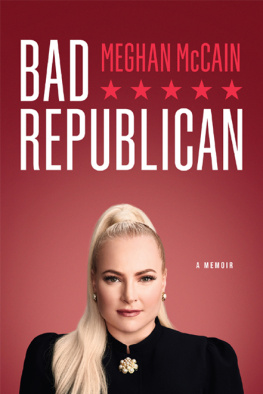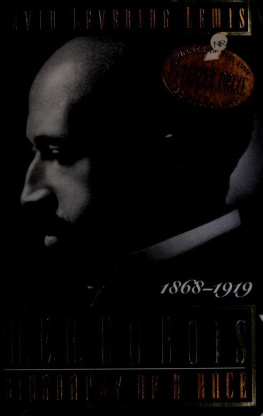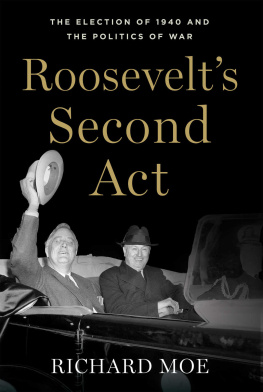Contents
Guide

OTHER BOOKS BY DAVID LEVERING LEWIS
W.E.B. Du Bois: A Biography
Gods Crucible: Islam and the Making of Europe, 5701215
W.E.B. Du Bois, 19191963: The Fight for Equality and the American Century
W.E.B. Du Bois, 18681919: Biography of a Race
When Harlem Was in Vogue
W.E.B. Du Bois: A Reader (editor)
The Portable Harlem Renaissance Reader (editor)
The Race to Fashoda: European Colonialism and African Resistance in the Scramble for Africa
District of Columbia: A Bicentennial History
Prisoners of Honor: The Dreyfus Affair
King: A Biography
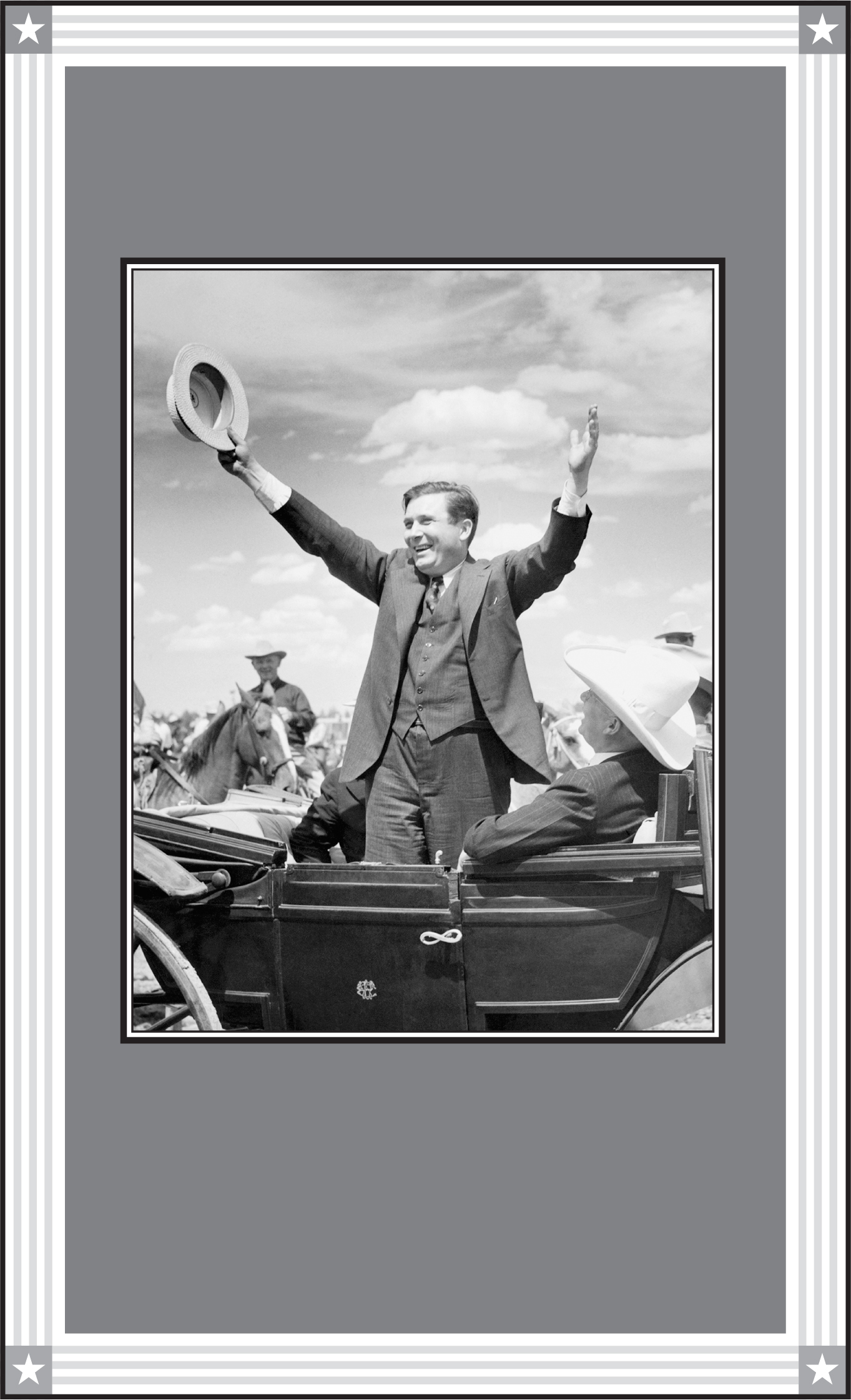

Copyright 2018 by David Levering Lewis
All rights reserved
First Edition
For information about permission to reproduce selections from this book, write to Permissions, Liveright Publishing Corporation, a division of W. W. Norton & Company, Inc., 500 Fifth Avenue, New York, NY 10110
For information about special discounts for bulk purchases, please contact W. W. Norton Special Sales at specialsales@wwnorton.com or 800-233-4830
Book design by JAMdesign
Production manager: Julia Druskin
Jacket design by Yang Kim
Jacket photograph: The Granger Collection, New York All Rights Reserved
The Library of Congress has cataloged the printed edition as follows:
Names: Lewis, David L., 1936 author.
Title: The improbable Wendell Willkie : the businessman who saved the Republican Party and his country, and conceived a new world order / David Levering Lewis.
Description: First edition. | New York : Liveright Publishing Corporation, a Division of W. W. Norton and Company, 2018. | Includes bibliographical references and index.
Identifiers: LCCN 2018013302 | ISBN 9780871404572 (hardcover)
Subjects: LCSH: Willkie, Wendell L. (Wendell Lewis), 18921944. | PoliticiansUnited StatesBiography. | Presidential candidatesUnited StatesBiography. | United StatesPolitics and government19331945.
Classification: LCC E748.W7 L48 2018 | DDC 324.2092 [B] dc23
LC record available at https://lccn.loc.gov/2018013302
ISBN: 978-1-631-9374-4 (e-Book)
Liveright Publishing Corporation, 500 Fifth Avenue, New York, N.Y. 10110
www.wwnorton.com
W. W. Norton & Company Ltd., 15 Carlisle Street, London W1D 3BS
TO NATALIE,
may hers be one world
CONTENTS
W endell Lewis Willkie (18921944) was one of the most exciting, intellectually able, and authentically transformational figures to stride the twentieth-century American political landscape. In an era of well-merited disgrace, Willkie served up the American business communitys most reasoned, politically effective, and judicially nimble defense against government regulation of the free-market economy. Wendell Willkie baited and debated Franklin Roosevelt, whose imperious sense of self-indispensability was turning his office into an imperial presidency, he warned with cracker-barrel farsightedness. His presidential campaign against Roosevelt was one of the toughest and bitterest (and most disorganized); after which, in defeat, he insisted that his party set a new standard of bipartisanship in Washington. He managed to outwit the isolationist leadership of the party (Herbert Hoover, Robert Taft, and Arthur Vandenberg) and engineer grudging recognition by the party platform of a qualified internationalism.
Lewis Wendell Willkie (at age twenty-five, he chose not to correct a US army clerks transposition of his name) was a dynamic work in progress, a principled egoist who seldom allowed conventions to stand in his way. By age forty-two, this bear of a German American lawyer from Elwood, Indiana, presided over Commonwealth & Southern, the nations second- or third-largest private utility holding company. After a five-year judicial slugfest in agile defense of free-market electricity against the Tennessee Valley Authority (TVA), he wrenched a 1939 monetary settlement from the US Treasury equivalent to 1.3 billion contemporary dollars.
Wendell Willkie was certainly one of the most unexpected, if not unlikely, candidates for the presidency from a major national party. He was more unexpected than William Jennings Bryan and only somewhat less unlikely than Barack Hussein Obama. The reaction of one New York GOP committeeman spoke volumes. When asked by a major contributor to pitch Willkies candidacy to the clubhouse party loyalists, a dismayed Kenneth Simpson listed the difficulties:
Theyll ask me, Willkie, whos Willkie? And Ill tell them hes president of the Commonwealth and Southern.... And I will explain that it isnt a railroad, its a public utility holding company. Then they will look at me sadly and say, Ken, we always have thought you were a little erratic, but now we know you are just plain crazy. And that would be without my even getting to mention that hes a Democrat.
In The Powers That Be, an expos of the print medias capacity to manipulate public opinion, historian David Halberstam leant credence to the accusation that Willkies political career was invented by a cabal of rich newspaper and magazine publishers educated at elite eastern institutions (e.g., Henry Luce, Ogden Mills Reid, Gardner and John Cowles). Yet Wendells democratic convictions were authentic. His well-publicized conflict with New Deal economic policies elicited plaudits from big business, yet his conception of responsible markets was more compatible with John Maynard Keyness than with Adam Smiths.
Wendells farm-boy haircut, hayseed manners, and sartorial indifference bespoke common-man straightforwardnessgrass-roots stuff, said a wary FDR. But this businessman-turned-politician possessed a supple intellect, a remarkable fund of knowledge, and a concealed disdain for parochial ideas. Indeed, he was constantly to surprise many admirers and bitterly disappoint more than a few intimates who mistook Willkies small-town Hoosier origins and big business success as the sum of the inner man.
Wendell, a registered Democrat only six months earlier, captured the 1940 Republican presidential nomination in a media blitz of news publications, radio, film, and experimental television new to the nation. He unnerved Franklin Roosevelt in his bid for an unprecedented third term, and he won an unexpectedly large popular vote. He imported British notions of the loyal opposition into American politics after his defeat, forging the bipartisanship that made Roosevelts foreign policy possible and United States entry into World War II a certainty.
With the wars outcome far from decided in 1942, Wendell lifted off that August on a round-the-world goodwill mission in a prototype B-24 with the blessings of FDR. Leader of his party, he took the principles of the Atlantic Charter seriously, dismaying Charles de Gaulle in Damascus and evoking Winston Churchills memorable House of Commons retort regarding Egypt and India. He gave the boy shah of Iran his first ride in a plane. He saw Beirut and Baghdad as distinguished world ambassador by day and adventurous student of their cultural character by night. He debated the virtues of private enterprise with Stalin. Geopolitics dictated that Wendell Willkie extoll the staying-power of Chiang Kai-sheks Kuomintang, despite the regimes metastasizing corruption. Sex and ambition dictated the tempestuous bonding of the ardent American visitor and the last empress, Madame Chiang Kai-shek.

